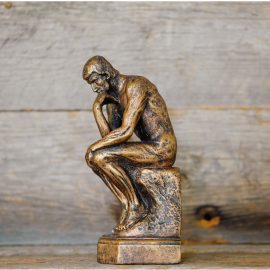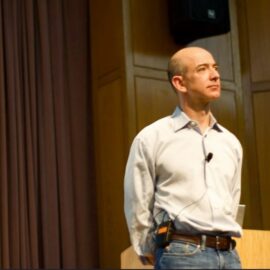
What’s determinism? Why does Sam Harris adopt this philosophy? Does it necessarily imply fatalism?
According to Sam Harris, determinism is the way the world works: We don’t (and can’t) have free will. Like other determinists, he believes that what we feel about our agency misleads us; what we experience when we’re thinking about a decision doesn’t indicate the true causes of our thoughts and actions.
Read more for Harris’s explanation of the determinist perspective in the debate over free will.
Sam Harris on Determinism
Determinists believe that we don’t have free will and that our thoughts, desires, intentions, and choices are determined by events outside our control. According to Sam Harris, determinism means that every event in the universe—including each of our thoughts, decisions, and actions—is caused by a long chain of events. We could theoretically trace this chain back to the beginning of our lives (or even back to the beginning of the universe) to find an explanation for any decision we make. Determinists argue that, if a decision is caused in this way by events that came before it, then it’s not made freely.
| Complicating Harris’s Views on Determinism Harris presents a succinct overview of determinist free will, but some experts view this theory in ways that differ substantially from Harris’s interpretation. Philosopher Mark Balaguer writes in his book (which is also titled Free Will) that the philosophy of determinism rests on the assumption that the science of determinism is true—but that’s still up for debate. Classical physics posits that determinism is true. Yet, as Stephen Hawking explains in A Brief History of Time, modern quantum mechanics is probabilistic, not deterministic: It explains what will probably happen next, not what will happen next. This means that at least some things aren’t caused by prior events but just happen. Balaguer characterizes a determinist argument (like Harris’s) as fatally flawed because determinism is still unproven and thus can’t provide proof that free will doesn’t exist. |
Harris adopts a determinist point of view. He writes that an array of external factors—events and influences that are outside of our control (like what our parents taught us when we were children) or even outside of our consciousness (like the subtle messages we’ve received from books, TV, and movies)—have conditioned our brains in precisely the right ways for it to make the decisions that we feel we’ve made freely. Because he contends that our thoughts and intentions are fully caused by these past events and by the systematic way that our brains respond to them, through processes that we can’t consciously access, Harris concludes that we don’t have free will.
(Shortform note: Harris is one of many experts who argue that what we’ve discovered about the brain rules out the possibility that we have free will. In Homo Deus, Yuval Noah Harari writes that neuroscientists have discovered that electrochemical processes in the brain create our thoughts and actions as a reaction to external stimuli. According to Harari, these reactions can be either predetermined, as in a direct response to a stimulus, or completely random—the result of something unpredictable. But whether these reactions are predetermined or random, they can’t be free, according to Harari, because we’re not conscious of them and can’t control them.)
Determinism vs. Libertarianism
As a determinist, Harris agrees with libertarians on incompatibilism: the idea that free will and determinism are inherently contradictory. But he disagrees with them on indeterminism: the idea that not everything is predetermined. Harris also rejects the libertarian idea that human behavior isn’t fully explained by the physical cause and effect that occurs when our brains respond to influences outside of our consciousness or to stimuli outside our bodies. He also objects to the way that some libertarians account for this complexity by arguing that we aren’t just physical entities and may even have something like a mind or a soul in addition to our physical matter. Harris rejects this possibility.
Determinism vs. Fatalism
Harris contends that, even without free will, our efforts still matter. He differentiates between determinism, or the idea that our thoughts and actions have a cause, and fatalism—the idea that whatever will happen will happen, whether we take action or just watch things play out. Harris writes that sitting back and doing nothing isn’t the answer: He says that, even though our decisions are caused, these decisions still matter, as does the effort we put into engaging in conscious thought and deliberation. This is because even though free will is an illusion, our choices and efforts still determine what kind of people we are and what kind of lives we live.






